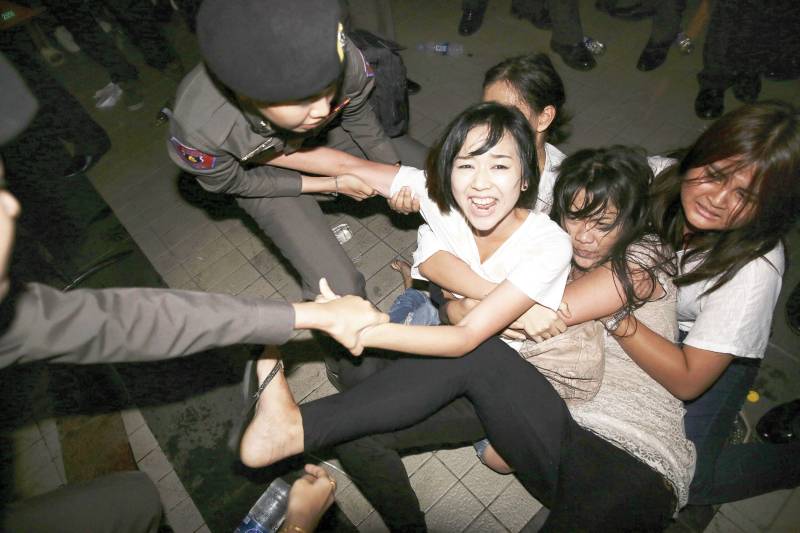BANGKOK - Police arrested several anti-junta activists Friday for small protests marking a year since Thailand’s generals seized power from the elected government, as the defiant junta leader said the country “may have collapsed” without his intervention.
A group of die-hard campaigners called ‘Resistant Citizen’, who have repeatedly defied the junta’s ban on political protests, were prevented from marching to a court in Bangkok to file treason charges against junta chief Prayut Chan-O-Cha. At least four of the group were arrested, an AFP photographer said.
Meanwhile seven students were wrestled to the ground and detained for holding an anti-coup banner in the northeastern city of Khon Kaen, a bastion of support for Yingluck Shinawatra whose government was toppled by the May 22, 2014 coup.
Student activists who have previously held creative “flash mob” acts of dissent - including readings of George Orwell’s anti-authoritarian novel “1984” and flashing the three-fingered salute from the Hunger Games films - have also said they will hold a protest in downtown Bangkok on Friday evening.
But widespread dissent appeared unlikely with the country still in lockdown.
Thailand’s military took over last May after months of violent protests by anti-government supporters paralysed the elected administration of Yingluck Shinawatra.
She was dumped out of office by a court ruling two weeks before the coup. Martial law was imposed two days before the coup by the military.
Her supporters say the putsch was the latest assault by the royalist Bangkok-centric elite on the kingdom’s burgeoning democratic forces - in particular from the culturally distinct northeast, which has voted Shinawatra parties to power in every election since 2001.
In the past year, protests have been smothered, dissenters arrested and anti-coup radio and television stations shut, while royal defamation cases have surged as rights groups say the space to speak freely diminishes.
The junta says its power grab restored order after months of protests against Yingluck left dozens dead and the economy in a straitjacket.
“I did it (the coup) myself because I thought that both the country and the people were in severe danger... I made up my mind alone,” former army chief-turned prime minister Prayut Chan-O-Cha told reporters on Friday.
“If I didn’t do it I wonder if our country may already have collapsed,” he said.
The junta says it is rebooting the kingdom’s economy - although economic growth last year was just 0.7 percent, the weakest in three years.
It is also rewriting the country’s constitution to end Thailand’s deep political divisions and expunge corruption.
Fresh elections were pencilled in for early-mid 2016 but Prayut said that timetable may slip if a referendum is held on the charter many see as a barely concealed attempt to hack back the Shinawatras’ political dominance.
The coup anniversary has been largely ignored by the ‘Red Shirt’ movement loyal to Yingluck and her brother, ex-premier Thaksin Shinawatra, who was also ousted in a coup in 2006 and now lives in self-exile.
Red Shirt leader Nattawut Saikua was one of the few to comment Friday, in a Facebook post that condemned Prayut’s year in power and accused the junta of “putting duct tape on top of a fresh wound without applying any medicine”.
In Isaan, the northeastern heartlands of the Shinawatras, soldiers in Humvees still conduct patrols into remote ‘Red Shirt’ villages, locals told AFP.
“Soldiers are very strict. There is nothing to gain from any movements. It’s better to wait,” a senior Red Shirt leader in the northeast told AFP, requesting anonymity after he was forced to sign an agreement with the military not to speak about politics.
“Everyone (the Red Shirts) is waiting for the election... I hope the army are gentlemanly enough not to break their promise to hold it.”
Thaksin has previously called on his Red Shirt supporters to refrain from protesting and remain patient.
Paul Chambers, director of research at the Institute of South East Asian Affairs in Chiang Mai, told AFP Thaksin’s non-confrontational stance points “to a preference for biding his time and a probable deal with the junta leaders”.
Thaksin’s sister Yingluck is banned from politics and faces up to 10 years in jail over criminal negligence charges linked to a costly subsidy scheme to her rice farming support base.
The junta has seen its support eroded even among its early political supporters, but still enjoys widespread popularity with the Bangkok elite and royalist southerners.
But analysts say the economy remains the military’s weak point with growth failing to take off despite the centralisation of powers.
Thursday, April 18, 2024
Arrests after anti-junta protests on coup anniversary

Stefanos Tsitsipas advances in Barcelona
4:19 PM | April 18, 2024
Met Office predicts more rains across country till April 29
2:51 PM | April 18, 2024
Punjab changes school timings for summer season
1:55 PM | April 18, 2024
Enemies of Pakistan are unable to digest investment in the country: Ataullah Tarar
1:29 PM | April 18, 2024
IHC restores Bushra Bibi's appeal for shifting to Adiala Jail from Bani Gala
1:24 PM | April 18, 2024
Hepatitis Challenge
April 18, 2024
IMF Predictions
April 18, 2024
Wheat War
April 18, 2024
Rail Revival
April 17, 2024
Addressing Climate Change
April 17, 2024
Justice denied
April 18, 2024
AI dilemmas unveiled
April 18, 2024
Tax tangle
April 18, 2024
Workforce inequality
April 17, 2024
New partnerships
April 17, 2024
ePaper - Nawaiwaqt
Advertisement
Nawaiwaqt Group | Copyright © 2024





